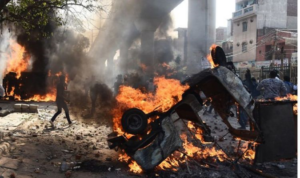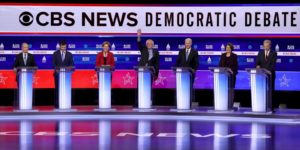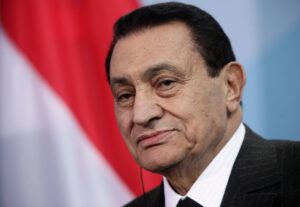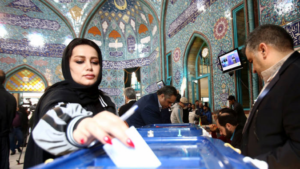
The National Interest Foundation Newsletter
Issue 34, February 27, 2020
Welcome to our latest edition of the NIF Newsletter. In this week’s headlines: President Trump visits India amid the country’s worst religious violence in decades, U.S. Democratic presidential candidates debate in the lead up to the South Carolina primary and Super Tuesday, former Egyptian leader Hosni Mubarak passes away at the age of 91, and the recent Iranian election sees record-low turnout in the midst of a coronavirus outbreak.
Religious Violence in India

Trump’s state visit to India was overshadowed by riots breaking out and religious violence against Muslims. (Photo from Reuters)
President Trump Visits India Amid a Wave of Religious Violence
President Trump concluded his first trip to India as president amid the backdrop of violent clashes breaking out between Hindus and Muslims throughout the country. Over 20 people have been killed, and hundreds injured, in riots over India’s contentious new citizenship law, the Citizenship Amendment Act. The law would provide Indian citizenship for minorities fleeing religious violence elsewhere in Southeast Asia, with the exception of Muslims. Hindu mobs in support of the new bill have been inciting violence during peaceful protests against the new law, and the situation has deteriorated rapidly in the last few days.
Democratic Debate in South Carolina

Democrats took to the debate stage for the final time before the South Carolina and Super Tuesday primaries. (Photo from Getty Images)
Final Debate Before the South Carolina Primary and Super Tuesday
Tuesday night saw the last debate for Democratic presidential hopefuls before the crucial primaries coming up over the next week. South Carolina’s primary is this Saturday, February 29th and will be followed by “Super Tuesday” on March 3rd, when 14 states and American Samoa will cast their votes. Traditionally, the race for the White House is shaped by the events of Super Tuesday, and each candidate’s path to the presidency becomes clear in the aftermath. On the stage in Charleston, South Carolina on Tuesday was former New York Mayor Mike Bloomberg, Mayor of South Bend Pete Buttigieg, Senator Bernie Sanders, Senator Elizabeth Warren, Senator Amy Klobuchar, former Vice President Joe Biden, and entrepreneur and activist Tom Steyer.
Hosni Mubarak

Following Mubarak’s death, the Egyptian government announced that there would be three days of public mourning for the former leader’s passing. (Photo from Getty Images)
Former Egyptian Leader Mubarak Passes Away at the Age of 91
Former Egyptian leader Hosni Mubarak passed away earlier this week in Cairo at the age of 91. Mubarak came to power in October of 1981 following the assassination of President Anwar Sadat, and ruled the North African nation for nearly 30 years until he was ousted in the 2011 Arab Spring. The autocratic leader’s time in office was plagued by corruption and political repression, and he spent six years in prison until 2017 on various charges after his removal from power. After being released from prison, Mubarak spent the final years of his life in Cairo’s Heliopolis district but had recently been hospitalized for several weeks following an operation to remove a stomach tumor. Egypt held a military funeral for Mubarak on Wednesday and the government declared that there would be three days of public mourning.
Iranian Election

Iran was struck by the lowest election turnout since 1979 amid the coronavirus outbreak. (Photo from Reuters)
Iranian Election Sees Record-Low Turnout
Religious hardliners in Iran had a strong showing in the country’s recent parliamentary election, although their success is tainted by the lowest turnout in an Iranian election since the 1979 revolution. Only 42.5% of eligible voters turned up at the ballot box, as a combination of renewed U.S. sanctions and an outbreak of the coronavirus deterred people from coming out. Iranians avoided voting to show their displeasure with the regime, despite Supreme Leader Ayatollah Ali Khamenei saying Iranians had a “religious duty” to vote. Khamenei also accused Western powers of exaggerating the effects of the coronavirus in Iran, despite the country having the highest number of deaths from the disease outside of China. Most recently, Iran’s deputy health minister Iraj Harirchi was diagnosed with the coronavirus, and Tehran has been accused of withholding internal information about the disease.
Enter the text or HTML code here
